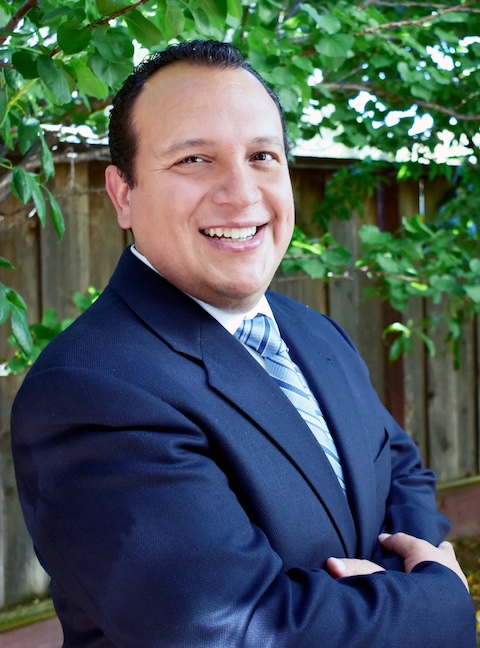
24 Oct Pittsburg Council Candidates Share Perspectives Ahead of November Election

(Image courtesy of the city of Pittsburg via Bay City News)
By Aly Brown
Bay City News
In November’s election, three candidates will compete for two at-large seats on the Pittsburg City Council: small business owner Iztaccuauhtli Hector Gonzalez and incumbents Juan Antonio Banales and Jelani Killings.
Learn more about them and their positions on issues impacting the city of Pittsburg before heading to the ballot box.
Nearing the end of his second term on the council — including two years in the mayor’s seat — Banales is seeking reelection. A Pittsburg native, he graduated from Pittsburg High School in 2009 before heading to University of California, Berkeley to obtain a bachelor’s degree in mechanical engineering. He works as an operations leader for Corteva Agriscience, an agricultural chemical and seed company with an office in Pittsburg.
According to his campaign website, Gonzalez, an insurance agent, has lived in Contra Costa County since he was 5 and has been a small business owner for more than 25 years. With a bachelor’s degree in history from Cal Poly San Luis Obispo, his background also includes teaching for the Pittsburg Unified School District and West Contra Costa Unified School District.
Also wrapping up his second term on the Pittsburg City Council, Killings, currently the vice mayor, hopes to win his seat for another four years. His professional background includes a decade with the Oakland Public Ethics Commission, focusing on education and compliance with campaign finance, transparency and government ethics laws.
[Editor’s note: All three candidates were given the same questions at the same time with a month to prepare their answers. Full Q&A can be found here: https://bit.ly/4dSffnL. Gonzalez did not respond to outreach or followup; some of the following information was pulled from his candidate website and the Contra Costa County voter information guide.]
PRIORITIES
Banales said economic development, youth development and infrastructure investment will be his top three priorities if elected for another four years.
“I am an experienced leader who knows how to get results for Pittsburg,” Banales said. “I have a record of delivering results for Pittsburg and will continue to do so if reelected.”
Killings’ priorities would be improving public facilities and infrastructure, expanding the service area for municipal electric and natural gas provider Pittsburg Power Company, and revitalizing and promoting the redevelopment of industrial zones.
“I bring a proven track record, extensive experience, and a strong commitment to achieving results for the residents of Pittsburg,” Killings said. “My deep understanding of our city equips me to effectively drive progress.”
In the voter guide, Gonzalez said his priorities are to champion innovative programs to make Pittsburg more vibrant, support police officers and firefighters, provide resources to prosecute criminals, promote economic development programs, support literacy programs in local schools and promote the history and culture of Pittsburg.
POLICING, CRIME, PUBLIC SAFETY
Following a federal investigation that uncovered conspiracy, fraud, civil rights violations and obstruction of justice among some officers of the Pittsburg Police Department, Killings said the City Council plays an important role in enhancing police-community relations.
“Since 2021, the City Council has provided quarterly updates on use-of-force and internal investigations during public meetings. This commitment to transparency has fostered trust and accountability regarding police interactions,” he said. “While the recent conspiracy and fraud charges have impacted some officers, it’s important to recognize that these issues do not reflect the integrity of the entire department.”
Gonzalez supports providing the funds to prosecute crime and vandalism and aims to encourage more neighborhood watch programs. He writes on his campaign site that he supports changing recent laws that have “left perpetrators of smaller acts of theft and vandalism without any consequences.”
“I support accountability and thank our county, state and federal officials for their help in their investigations and help in holding our officers accountable,” Gonzalez stated. “By having an extensive hiring system, screening, training, constant ongoing training, modern working body cameras with audio, and other sources of accountability, we can have a superb group of law enforcement officers.”
Both Banales and Killings support Proposition 36, which would allow felony charges and increase sentences for certain drug and theft crimes.
“I’m hopeful that Prop. 36 will pass, as it aims to mitigate some of the negative impacts of Prop. 47,” Killings said, referring to the 2014 initiative designed to reduce prison capacity by changing nonviolent felonies into misdemeanors. “Additionally, Prop. 36 will provide much-needed support for substance abuse and mental health services, which are often linked to various public safety challenges.”
HOMELESSNESS
Following a late June decision by the U.S. Supreme Court, which overturned lower court rulings that found it cruel under the Eighth Amendment to punish people for sleeping outdoors, Gov. Gavin Newsom issued an executive order to clear homeless encampments.
When asked whether he supports this in his city, Killings called for greater transparency and accountability regarding the allocation of funds aimed at addressing homelessness.
“Despite spending billions, the results have been minimal,” Killings said. “While clearing homeless encampments is necessary due to public health and safety concerns for both the community and the individuals residing in those encampments, it’s important that these actions are supported by a comprehensive approach to solving homelessness.”
Banales said he was in favor of efforts to clear encampments. He also expressed support of more funding at the state level to create additional substance abuse treatment and mental health treatment programs.
“We fund and support a (Coordinated Outreach Referral, Engagement) outreach team dedicated solely to Pittsburg,” Banales said, referring to the county health department’s program to help facilitate housing or health care for the homeless. “We supported the opening of the Delta Landing facility at the old Motel 6 site. We partnered with The Bay Church to offer a weekly shower program which has been very successful.”
Killings highlighted data from the county that revealed the leading factors contributing to homelessness to be substance abuse (41%), job loss (27%) and mental health conditions (24%).
“Alarmingly, about one-third of California’s homeless population struggles with untreated severe mental illness,” Killings continued. “Reducing homelessness requires a coordinated approach to assess individuals’ needs and provide the necessary support for them to achieve self-sufficiency.”
HOUSING
Amid a housing crisis, state laws have forced local governments to approve housing that meets zoning and affordable requirements. Killings and Banales both expressed strong support for local control when it comes to housing development.
“State mandates often lead to inequities and regional imbalances,” Killings said. “For years, Contra Costa County has served as a housing and workforce source for the broader Bay Area, resulting in bedroom communities that struggle with significant job-housing imbalances. After decades of state laws hindering housing development, the current approach imposes zoning standards and requirements that conflict with local needs.”
He noted that the 2040 General Plan outlines the city’s vision for development and will focus on infill projects and mixed-use developments near commercial hubs. He also pointed out that Pittsburg is currently leading the county in meeting its Regional Housing Needs Allocation — the state-mandated process to determine the amount of housing each region needs.
Banales further stated that Pittsburg has built its “fair share of affordable housing development and our focus is on market-rate, entry-level and estate-level single-family homes.”
Killings said the city should focus on the development of starter homes to enable working families to achieve homeownership.
“Emphasizing the construction of condos, duplexes, and smaller lot detached homes will create pathways to homeownership, allowing families to build equity and establish generational wealth within the community,” Killings said.
Killings expressed reservations about policies like rent control.
“In my view, these policies can discourage private investment, which negatively affects housing supply and ultimately increases costs,” Killings said. “Observing the Bay Area, cities with long-standing rent-control measures tend to be the most expensive and face multiple challenges, including housing shortages, public safety issues, homelessness, and budget deficits.”
He also called for the establishment of job centers locally and throughout the county to improve conditions for commuters on state Highway 4.
“As the fastest-growing area in the county, we face some of the state’s most challenging commute times,” Killings continued. “By attracting employers to our region, we can create more job opportunities closer to home and help reverse the current commute trend.”
To read the full Q&A, visit https://bit.ly/4dSffnL.
Copyright © 2024 Bay City News, Inc. All rights reserved. Republication, rebroadcast or redistribution without the express written consent of Bay City News, Inc. is prohibited. Bay City News is a 24/7 news service covering the greater Bay Area.






No Comments